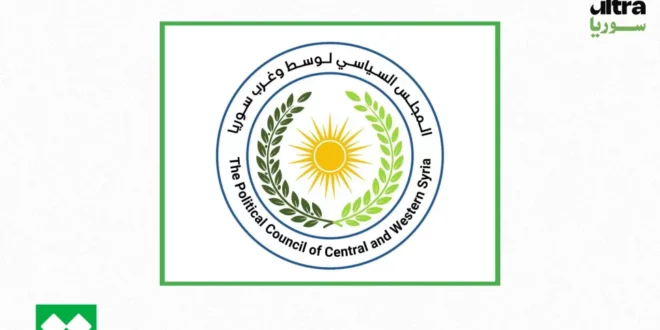On Wednesday, 27 August 2025, a group of Alawite activists based abroad announced the formation of the “Political Council for Central and Western Syria” (PCCWS). In a founding statement published via a recorded video on its official Facebook page, the council called for the establishment of a federal region encompassing the governorates of Tartous, Lattakia, Homs, and parts of rural Hama—under the name “Central and Western Syria Region.”
According to the statement, the council regards federalism as “the most effective way to resolve conflicts within these regions in a comprehensive sense, following the failure of the centralised state to offer solutions.” While the movement originates within the Alawite community, the council expressed its intent to include other societal components, emphasising the goal of reaching a broad consensus on governance throughout Syria.
The council harshly criticised the current transitional authority, labelling it “a terrorist system that seized power in a specific political context with full support from Turkey.” It also called for full implementation of UN Security Council Resolution 2254 within its original 18-month framework, which includes the formation of a transitional governing body with full executive powers, the drafting of a democratic, civil constitution, and the enactment of an electoral law to prepare for general elections.
Further demands include the convening of a new national conference under United Nations supervision and the establishment of a federal system “as the most suitable model for a secular, democratic Syria.” The council rejected what it described as a “single-colour government formed by the de facto authority on religious and sectarian exclusionary grounds” and urged the expulsion of all “terrorist factions” from Syrian territory.
Broader Context and Parallel Developments
The PCCWS announcement coincides with similar moves in Sweida, where Sheikh Hikmat al-Hijri, the spiritual leader of the Druze community, recently called on “the world’s nations and free peoples to support Sweida’s declaration as a separate region to protect us.” Days earlier, protests in Sweida were held under the slogan “Right to Self-Determination,” with demonstrators calling for independence and waving Israeli flags. Placards bore slogans such as “We want Israel,” “Our land, our decision, our independence is our salvation,” and “We cannot live with a terrorist government; we demand independence.”
This public call for secession—coupled with open displays of Israeli symbols—marks a first for Sweida. Sheikh al-Hijri had previously thanked Israel’s government and people for what he described as a “humanitarian intervention to prevent massacres” in the governorate, a statement made during a conference titled Unity of Position for Northeast Syria’s Components, hosted by the Syrian Democratic Forces (SDF).
Analysis
The formation of the PCCWS is emblematic of a growing trend towards regional autonomy or federalism in Syria, fuelled by widespread disillusionment with centralised governance and perceived exclusion under the transitional authority. The call for federalism echoes historical precedents—such as the short-lived “Syrian Union” under French mandate in 1922, which featured semi-autonomous entities in Lattakia and Suweida.
However, the Alawite identity of the PCCWS leadership and its accusatory rhetoric toward the current transitional government risk intensifying societal divisions, particularly at a time when Syria is undergoing a fragile political transition.
Meanwhile, the developments in Sweida, including overtly pro-Israel messaging and calls for separation, are unprecedented and controversial. These sentiments may alienate other Syrian factions and complicate an already tense regional landscape—especially given Israel’s long history of military operations and intelligence activity in Syrian territory, most recently highlighted in the al-Kiswah incident.
The SDF’s involvement in hosting related conferences suggests a broader federalist momentum, although the group’s own constitutional initiatives in Raqqa have sparked concern over potential separatist ambitions.
Key Considerations
Sectarian Tensions: The sectarian framing—Alawite-led in the case of the PCCWS, and Druze-led in Sweida—could exacerbate existing divisions and undermine efforts toward inclusive national dialogue under UN Resolution 2254.
Foreign Influence: The PCCWS’s claims of Turkish support for the transitional authority, combined with Sweida’s pro-Israel rhetoric, point to a complex matrix of external influence that may further destabilise Syria’s internal dynamics.
Socioeconomic Grievances: As seen in Aleppo and across the country, economic hardship and disenfranchisement remain widespread. While federalism may offer one pathway toward decentralisation, without equitable distribution of resources and infrastructure investment, it risks institutionalising disparities.The PCCWS’s push for federalism, although reflective of real frustrations, must tread carefully to avoid fuelling fragmentation or inviting further external manipulation. A UN-supervised national conference—as the council proposes—could provide a platform for inclusive dialogue, but it must be accompanied by genuine efforts to deliver economic stability, ensure minority protections, and avoid re-entrenching sectarian fault lines.
 Eurasia Press & News
Eurasia Press & News



